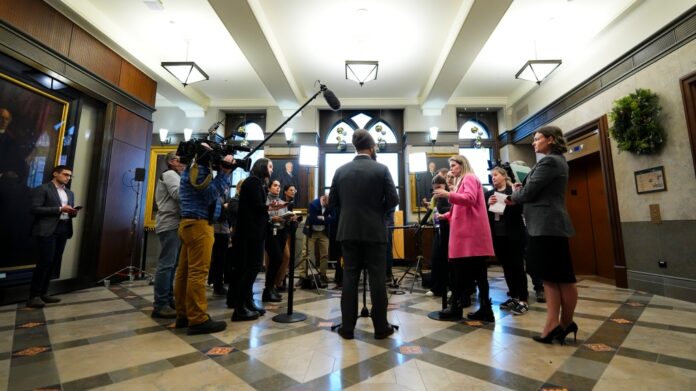After telling Canadians that New Democrats would back Prime Minister Justin Trudeau’s holiday affordability package and help pass it quickly, NDP Leader Jagmeet Singh now wants it split up, as he’s only ready to support part of it.
Last Thursday, Trudeau announced a $6.3-billion affordability package that included a two-month tax reprieve on a slate of items, from some essentials to common stocking stuffers, starting in mid-December and running through mid-February, as well as a new one-time benefit payment of $250 for 18.7 million workers, which would roll out in April.
Later that day, Singh said New Democrats were behind the proposal and would give the minority Liberals the votes they needed to expedite the package through an otherwise-stalled Parliament.
Now, after reading more specifics, Singh wants changes, as he’s concerned that too many Canadians were left out of the workers’ benefit.
“We know that Canadians need a break… but we learned on Friday that the cheques are being excluded from some of the most vulnerable Canadians,” Singh said. “From seniors, from people living with disabilities, and from students.”
“It is a slap in the face,” he added.
He is now calling on the Liberals to “fix” the benefit to include more Canadians — who he “assumed” would qualify for it — while maintaining his support for passing the GST holiday into law.
“We’re saying, ‘Let’s move ahead on the GST holiday right away, we can get that done this week’… but the Liberals right now need to fix the cheques,” he said.
Singh, who was briefed on the announcement before it was made, would not say if his calls for expanding the benefit cheques would be an ultimatum or a deal-breaker when it comes to supporting the package overall.
“We need some clarity from the Liberals,” he said. “We’re more concerned about what’s not in the bill.”
Deputy Prime Minister and Finance Minister Chrystia Freeland confirmed Monday that the government quietly tabled draft legislation on Friday outlining how they’d enact these measures, “so that MPs from other parties would have a chance to see what we are proposing.”
She said the Liberals were having “energetic conversations with other parties about these measures.”
The actual bill, or bills to advance the tax break and $250 workers’ benefit in Parliament, have yet to be presented. Freeland asserted Monday that both affordability-focused offerings will not be extended and will remain temporary — as billed — should they pass and become a reality.
Bloc pans Liberals for ‘suddenly’ having billions to spend
Bloc Quebecois Leader Yves-François Blanchet told reporters on Parliament Hill Monday that his party will not support the proposal, unless the benefit portion is expanded to include seniors and retired Canadians.
In September, Blanchet gave the Liberals an ultimatum, calling on them to help pass a boost to Old Age Security payments if they wanted Bloc support on confidence votes going forward.
The federal government dismissed the measure as insufficiently targeted and too expensive, at a cost of about $3 billion. Now, Blanchet says he will not support the Canada Workers Benefit for the same reason.
“The government said it doesn’t have $3 billion, and suddenly it has $6 billion,” he said in French.
The GST and HST holiday is estimated to cost $1.6 billion, while the cheques heading to Canadians who made $150,000 or less last year, is set to cost $4.7 billion.
Blanchet said he was “fascinated” at the NDP’s initial support of the Liberal plan, and criticized the procedural hoops through which MPs may have to jump to get the bill passed.
“My problem with this, is that the people who need the most this money, are not the people who will receive access to this money,” Blanchet said in English.
In an interview on CTV News Channel’s Power Play on Monday, Public Services and Procurement Minister Jean-Yves Duclos said the Liberals are “certainly open to working with the opposition parties,” to find a path forward.
“We cannot do anything for Canadians unless another opposition party supports us… We’ll obviously need to have a conversation with the NDP and other opposition parties,” he told host Vassy Kapelos.
Last week, Conservative Leader Pierre Poilievre called the proposed tax relief measures a “two-month temporary tax trick,” and said he wanted to see the legislative specifics and speak with his caucus this week, before announcing if they’d support it.
Today in question period, Poilievre said Singh is “giving Canadians whiplash with his latest flip flop and the flop on the flip.”
Filibuster persists amid acrimony
This holiday relief package was seen as a potential way for the Liberals to secure the NDP’s support in helping break what’s now been a several-weeks-long stalemate in the House of Commons, even temporarily.
Now, that prospect appears to also be in question, with no end in sight to the Conservative-led filibuster of a privilege debate that’s persisted since September.
When asked Monday, Singh was unable to clarify where things stood procedurally, after vowing last week his party would get behind a programming motion to expedite the passage of the package through all stages within one sitting, before resuming the standoff.
MPs have been seized with a discussion about their work being impeded by Trudeau’s government not turning over documents related to misspending by a now-defunct green technology fund.
Addressing an issue that had been simmering for months, House of Commons Speaker Greg Fergus ruled on Sept. 26 that the Liberals did not fully comply with a House order seeking materials related to a Sustainable Development Technology Canada program the Conservatives are calling a “green slush fund.”
This opened the ability for the Official Opposition to demand the Liberals hand over unredacted copies to the RCMP and advance a priority motion to — as the House Speaker suggested, given the extraordinary circumstances — have the issue studied at the Procedure and House Affairs Committee.
Deliberations on the proposal take precedence over most other House business and have essentially seized the Commons since.
“Parliament is not functioning right now,” Freeland said Monday. “We’re in a minority in Parliament. We do not control it.”
The Liberals have taken the stance that passing this paperwork on to police would set a dangerous precedent and be an abuse of Parliament’s power. Last week, another tranche of 29,000 pages was turned over, but with redactions.
This was not enough to satisfy the Conservatives, who keep talking out the clock, preventing the motion from coming to a vote. They stated that if the government wants to get back to business, they need to be transparent.
And, waiting in the wings, is a second privilege motion seeking to find Liberal MP and former minister Randy Boissonnault’s ex-business partner in contempt of Parliament, which would also have to be disposed of in order for ordinary order of business to resume.
Speaker warns of nearing deadlines
Beyond preventing government legislation from advancing, the procedural standoff is having knock-on effects on other key elements of parliamentary business.
Specifically, the House of Commons is cutting it close when it comes to having time to deal with the supplementary estimates, and the remaining “supply” days — or opposition days, as they’re more commonly called.
Last Thursday, Speaker Fergus warned MPs that the rules do require them to make certain financial approvals and deal with related business within the next few weeks, and implored parliamentarians to find a path forward.
This means both Treasury Board President Anita Anand’s recently tabled supplementary estimates — which seeks to have MP sign off on additional spending for certain departments and programs for the fiscal year ending March 31, 2025 — as well as the outstanding opposition days, need to be delt with by Dec. 10.
“As we get closer to the end of the current supply period, the chair wishes to encourage the House leaders to keep these various principles in mind,” Fergus said. ” I am confident that they can find ways to reconcile these important responsibilities.”
There are four outstanding opposition days to be called in the current supply cycle. These allotted days are designed to allow opposition parties to “present its grievances.”
Without approval to flow funds, some federal agencies could face a financial shortfall and could lead to a U.S.-style shutdown in the spring if the standoff persisted.
Some parliamentary observers have speculated that a prolonged inability for the government to pass spending measures could in effect signal they’ve lost the confidence needed to keep this Parliament alive.
With files from CTV News’ Spencer Van Dyk

